58 have author last names that start with Z have author last names that start with Z

Jacopo Zabarella's two treatises On Methods and On Regressus (1578) are among the most important Renaissance discussions of how scientific knowledge should be acquired, arranged, and transmitted. They belong to a lively debate about the order in which sciences should be taught and the method to be followed in scientific demonstration that roiled the Late Renaissance world for decades. In these famous works Zabarella rejected the views of Ramists and modern Galenists in favor of the pure doctrine of Aristotle, freed from misunderstandings foisted upon it by medieval interpreters. The influence of these works on Galileo's scientific method and Descartes' famous Discourse on Method (1637) has long been debated. They are here translated into English for the first time, along with a new Latin text based on the corrected 1586 edition.
Volume 1 contains On Methods, Books I-II. Volume 2 contains On Methods, Books III-IV, and On Regressus.

Jacopo Zabarella's two treatises On Methods and On Regressus (1578) are among the most important Renaissance discussions of how scientific knowledge should be acquired, arranged, and transmitted. They belong to a lively debate about the order in which sciences should be taught and the method to be followed in scientific demonstration that roiled the Late Renaissance world for decades. In these famous works Zabarella rejected the views of Ramists and modern Galenists in favor of the pure doctrine of Aristotle, freed from misunderstandings foisted upon it by medieval interpreters. The influence of these works on Galileo's scientific method and Descartes' famous Discourse on Method (1637) has long been debated. They are here translated into English for the first time, along with a new Latin text based on the corrected 1586 edition.
Volume 1 contains On Methods, Books I-II. Volume 2 contains On Methods, Books III-IV, and On Regressus.
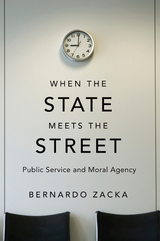
When the State Meets the Street probes the complex moral lives of street-level bureaucrats: the frontline social and welfare workers, police officers, and educators who represent government’s human face to ordinary citizens. Too often dismissed as soulless operators, these workers wield a significant margin of discretion and make decisions that profoundly affect people’s lives. Combining insights from political theory with his own ethnographic fieldwork as a receptionist in an urban antipoverty agency, Bernardo Zacka shows us firsthand the predicament in which these public servants are entangled.
Public policy consists of rules and regulations, but its implementation depends on how street-level bureaucrats interpret them and exercise discretionary judgment. These workers are expected to act as sensible moral agents in a working environment that is notoriously challenging and that conspires against them. Confronted by the pressures of everyday work, they often and unknowingly settle for one of several reductive conceptions of their responsibilities, each by itself pathological in the face of a complex, messy reality. Zacka examines the factors that contribute to this erosion of moral sensibility and what it takes to remain a balanced moral agent in such difficult conditions.
Zacka’s revisionary portrait reveals bureaucratic life as more fluid and ethically fraught than most citizens realize. It invites us to approach the political theory of the democratic state from the bottom-up, thinking not just about what policies the state should adopt but also about how it ought to interact with citizens when implementing these policies.

The religious persecution and intellectual intolerance of the sixteenth and seventeenth centuries compelled many heterodox groups and thinkers to resort to misdirection, hidden meaning, secrecy, and deceit. In this highly unusual interpretation, Perez Zagorin traces the theory and practice of religious leaders, philosophers, intellectuals, and men of letters who used deception to cloak dissident beliefs.
Zagorin surveys some of the chief sources of early modern doctrines of dissimulation in the Bible and the works of theologians from Jerome andAugustine to Erasmus, Luther, and Calvin. Subjects covered include Nicodemism, the name given by Calvin to secret Protestants who concealed their faith behind a facade of conformity to Catholic worship; crypto-Judaism in Spain; and the hidden beliefs of English Catholics. Other topics include the Catholic doctrine of mental reservation; the place of dissimulation in English Protestant casuistry; occultism; and dissimulation of religious unbelief among philosophers and men of letters. In charting the widespread phenomenon of lying and deceit and by exploring its evolutions, Perez Zagorin has made an important contribution to the historiography of an intellectually roiling and perilous time. He adds a vital dimension to our understanding of the religious, intellectual, and cultural history of the epoch before the modern. Lacey Baldwin Smith finds this hook “an impressive and scholarly work of cultural synthesis that coins a fresh label for the sixteenth and seventeenth centuries: the age of dissimulation. Zagorin’s efforts to compare and contrast Catholic and Protestant styles of dissimulation and Nicodemism are important, casting a new perspective and focus on the religious and intellectual dissent of the era.”
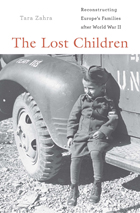
During the Second World War, an unprecedented number of families were torn apart. As the Nazi empire crumbled, millions roamed the continent in search of their loved ones. The Lost Children tells the story of these families, and of the struggle to determine their fate. We see how the reconstruction of families quickly became synonymous with the survival of European civilization itself.
Even as Allied officials and humanitarian organizations proclaimed a new era of individualist and internationalist values, Tara Zahra demonstrates that they defined the “best interests” of children in nationalist terms. Sovereign nations and families were seen as the key to the psychological rehabilitation of traumatized individuals and the peace and stability of Europe.
Based on original research in German, French, Czech, Polish, and American archives, The Lost Children is a heartbreaking and mesmerizing story. It brings together the histories of eastern and western Europe, and traces the efforts of everyone—from Jewish Holocaust survivors to German refugees, from Communist officials to American social workers—to rebuild the lives of displaced children. It reveals that many seemingly timeless ideals of the family were actually conceived in the concentration camps, orphanages, and refugee camps of the Second World War, and shows how the process of reconstruction shaped Cold War ideologies and ideas about childhood and national identity. This riveting tale of families destroyed by war reverberates in the lost children of today’s wars and in the compelling issues of international adoption, human rights and humanitarianism, and refugee policies.

Whether flying a kite in Franklin Park, gardening in the Fens, or jogging along the Riverway, today’s Bostonians are greatly indebted to the legacy of Frederick Law Olmsted. The man who dreamed of an “emerald necklace” of parks for Boston completed his plans in 1895, yet his invigorating influence shapes the city to this day, despite the encroachment of highways and urban sprawl. Cynthia Zaitzevsky’s book is the first fully illustrated account of Olmsted’s work: the process of “getting the plan” of a park, supervising its construction, adding the necessary “furniture” of bridges and other structures, and selecting plants, shrubs, and trees.
Frederick Law Olmsted’s stellar career in landscape architecture began with his design for Central Park in New York City. Public concern for open spaces led Boston to commission Olmsted to design peaceful “country parks” for the mental and physical refreshment of those who lived in the expanding city. He planned the system of five parks and connecting parkways extending out from the original Boston Common and Public Garden, as well as harbor and riverfront improvements—a vast set of projects involving 2,000 acres of open land. He and his firm also designed many smaller parks, playgrounds, and suburban subdivisions.
This book will be invaluable to anyone interested in landscape architecture, city planning, the history of Boston, or the nineteenth-century urban park movement and its current revival.
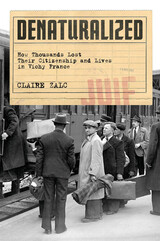
“In Denaturalized, Claire Zalc combines the precision of the scholar with the passion of a storyteller…This is a deftly written book. Zalc combines in an accessible style (smoothly translated by Catherine Porter) the stories of people trapped within a bureaucracy that was as obsessed, perhaps, with clearing files as with hunting Jews. In other words, Zalc reminds us how cruel the banality of indifference could be.”—Wall Street Journal
Winner of the Prix d’histoire de la justice
A leading historian radically revises our understanding of the fate of Jews under the Vichy regime.
Thousands of naturalized French men and women had their citizenship revoked by the Vichy government during the Second World War. Once denaturalized, these men and women, mostly Jews who were later sent to concentration camps, ceased being French on official records and walked off the pages of history. As a result, we have for decades severely underestimated the number of French Jews murdered by Nazis during the Holocaust. In Denaturalized, Claire Zalc unearths this tragic record and rewrites World War II history.
At its core, this is a detective story. How do we trace a citizen made alien by the law? How do we solve a murder when the body has vanished? Faced with the absence of straightforward evidence, Zalc turned to the original naturalization papers in order to uncover how denaturalization later occurred. She discovered that, in many cases, the very officials who granted citizenship to foreigners before 1940 were the ones who retracted it under Vichy rule.
The idea of citizenship has always existed alongside the threat of its revocation, and this is especially true for those who are naturalized citizens of a modern state. At a time when the status of millions of naturalized citizens in the United States and around the world is under greater scrutiny, Denaturalized turns our attention to the precariousness of the naturalized experience—the darkness that can befall those who suddenly find themselves legally cast out.
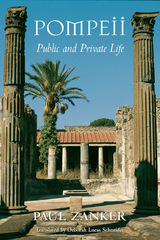
Pompeii's tragedy is our windfall: an ancient city fully preserved, its urban design and domestic styles speaking across the ages. This richly illustrated book conducts us through the captured wonders of Pompeii, evoking at every turn the life of the city as it was 2,000 years ago.
When Vesuvius erupted in 79 A.D. its lava preserved not only the Pompeii of that time but a palimpsest of the city's history, visible traces of the different societies of Pompeii's past. Paul Zanker, a noted authority on Roman art and architecture, disentangles these tantalizing traces to show us the urban images that marked Pompeii's development from country town to Roman imperial city. Exploring Pompeii's public buildings, its streets and gathering places, we witness the impact of religious changes, the renovation of theaters and expansion of athletic facilities, and the influence of elite families on the city's appearance. Through these stages, Zanker adeptly conjures a sense of the political and social meanings in urban planning and public architecture.
The private houses of Pompeii prove equally eloquent, their layout, decor, and architectural detail speaking volumes about the life, taste, and desires of their owners. At home or in public, at work or at ease, these Pompeians and their world come alive in Zanker's masterly rendering. A provocative and original reading of material culture, his work is an incomparable introduction to urban life in antiquity.
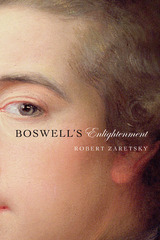
Throughout his life, James Boswell struggled to fashion a clear account of himself, but try as he might, he could not reconcile the truths of his era with those of his religious upbringing. Boswell’s Enlightenment examines the conflicting credos of reason and faith, progress and tradition that pulled Boswell, like so many eighteenth-century Europeans, in opposing directions. In the end, the life of the man best known for writing Samuel Johnson’s biography was something of a patchwork affair. As Johnson himself understood: “That creature was its own tormentor, and I believe its name was BOSWELL.”
Few periods in Boswell’s life better crystallize this internal turmoil than 1763–1765, the years of his Grand Tour and the focus of Robert Zaretsky’s thrilling intellectual adventure. From the moment Boswell sailed for Holland from the port of Harwich, leaving behind on the beach his newly made friend Dr. Johnson, to his return to Dover from Calais a year and a half later, the young Scot was intent on not just touring historic and religious sites but also canvassing the views of the greatest thinkers of the age. In his relentless quizzing of Voltaire and Rousseau, Hume and Johnson, Paoli and Wilkes on topics concerning faith, the soul, and death, he was not merely a celebrity-seeker but—for want of a better term—a truth-seeker. Zaretsky reveals a life more complex and compelling than suggested by the label “Johnson’s biographer,” and one that 250 years later registers our own variations of mind.
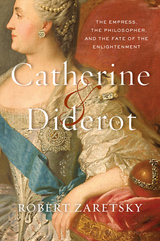
A dual biography crafted around the famous encounter between the French philosopher who wrote about power and the Russian empress who wielded it with great aplomb.
In October 1773, after a grueling trek from Paris, the aged and ailing Denis Diderot stumbled from a carriage in wintery St. Petersburg. The century’s most subversive thinker, Diderot arrived as the guest of its most ambitious and admired ruler, Empress Catherine of Russia. What followed was unprecedented: more than forty private meetings, stretching over nearly four months, between these two extraordinary figures. Diderot had come from Paris in order to guide—or so he thought—the woman who had become the continent’s last great hope for an enlightened ruler. But as it soon became clear, Catherine had a very different understanding not just of her role but of his as well. Philosophers, she claimed, had the luxury of writing on unfeeling paper. Rulers had the task of writing on human skin, sensitive to the slightest touch.
Diderot and Catherine’s series of meetings, held in her private chambers at the Hermitage, captured the imagination of their contemporaries. While heads of state like Frederick of Prussia feared the consequences of these conversations, intellectuals like Voltaire hoped they would further the goals of the Enlightenment.
In Catherine & Diderot, Robert Zaretsky traces the lives of these two remarkable figures, inviting us to reflect on the fraught relationship between politics and philosophy, and between a man of thought and a woman of action.

In his Nobel Prize acceptance speech, Albert Camus declared that a writer's duty is twofold: "the refusal to lie about what one knows and the resistance against oppression." These twin obsessions help explain something of Camus' remarkable character, which is the overarching subject of this sympathetic and lively book. Through an exploration of themes that preoccupied Camus--absurdity, silence, revolt, fidelity, and moderation--Robert Zaretsky portrays a moralist who refused to be fooled by the nobler names we assign to our actions, and who pushed himself, and those about him, to challenge the status quo.
Though we do not face the same dangers that threatened Europe when Camus wrote The Myth of Sisyphus and The Stranger, we confront other alarms. Herein lies Camus' abiding significance. Reading his work, we become more thoughtful observers of our own lives. For Camus, rebellion is an eternal human condition, a timeless struggle against injustice that makes life worth living. But rebellion is also bounded by self-imposed constraints--it is a noble if impossible ideal. Such a contradiction suggests that if there is no reason for hope, there is also no occasion for despair--a sentiment perhaps better suited for the ancient tragedians than modern political theorists but one whose wisdom abides. Yet we must not venerate suffering, Camus cautions: the world's beauty demands our attention no less than life's train of injustices. That recognition permits him to declare: "It was the middle of winter, I finally realized that, within me, summer was inextinguishable."
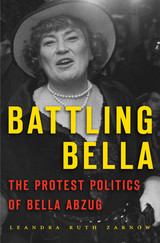
Bella Abzug’s promotion of women’s and gay rights, universal childcare, green energy, and more provoked not only fierce opposition from Republicans but a split within her own party. The story of this notorious, galvanizing force in the Democrats’ “New Politics” insurgency is a biography for our times.
Before Alexandria Ocasio-Cortez, Elizabeth Warren, or Hillary Clinton, there was New York’s Bella Abzug. With a fiery rhetorical style forged in the 1960s antiwar movement, Abzug vigorously promoted gender parity, economic justice, and the need to “bring Congress back to the people.”
The 1970 congressional election season saw Abzug, in her trademark broad-brimmed hats, campaigning on the slogan “This Woman’s Place Is in the House—the House of Representatives.” Having won her seat, she advanced the feminist agenda in ways big and small, from gaining full access for congresswomen to the House swimming pool to cofounding the National Women’s Political Caucus to putting the title “Ms.” into the political lexicon. Beyond women’s rights, “Sister Bella” promoted gay rights, privacy rights, and human rights, and pushed legislation relating to urban, environmental, and foreign affairs.
Her stint in Congress lasted just six years—it ended when she decided to seek the Democrats’ 1976 New York Senate nomination, a race she lost to Daniel Patrick Moynihan by less than 1 percent. Their primary contest, while gendered, was also an ideological struggle for the heart of the Democratic Party. Abzug’s protest politics had helped for a time to shift the center of politics to the left, but her progressive positions also fueled a backlash from conservatives who thought change was going too far.
This deeply researched political biography highlights how, as 1960s radicalism moved protest into electoral politics, Abzug drew fire from establishment politicians across the political spectrum—but also inspired a generation of women.

Speaking about Chinese writing entails thinking about how writing speaks through various media. In the guises of the written character and its imprints, traces, or ruins, writing is more than textuality. The goal of this volume is to consider the relationship of writing to materiality in China’s literary history and to ponder the physical aspects of the production and circulation of writing. To speak of the thing-ness of writing is to understand it as a thing in constant motion, transported from one place or time to another, one genre or medium to another, one person or public to another.
Thinking about writing as the material product of a culture shifts the emphasis from the author as the creator and ultimate arbiter of a text’s meaning to the editors, publishers, collectors, and readers through whose hands a text is reshaped, disseminated, and given new meanings. By yoking writing and materiality, the contributors to this volume aim to bypass the tendency to oppose form and content, words and things, documents and artifacts, to rethink key issues in the interpretation of Chinese literary and visual culture.

Officials mingled in the lobby of the Oktyabrskaia Hotel--shaking hands, sipping champagne, signing their names--and Germany was united. In this undramatic fashion, the international community closed the book on the drama of divided Germany. But nothing so momentous could be quite so quiet and uncomplicated, as this volume makes strikingly clear. This is the first book to go behind the scenes through access to still not opened archives in many countries. Germany Unified and Europe Transformed discloses the moves and maneuvers that ended the Cold War division of Europe.
Philip Zelikow and Condoleezza Rice, who served in the White House during these years, have combed a vast number of documents and other sources in German and Russian as well as English. They also interviewed the major actors in the drama--George Bush, Hans-Dietrich Genscher, Eduard Shevardnadze, James Baker, Anatoly Chernyayev, Brent Scowcroft, Horst Teltschik, and many others. Their firsthand accounts merge to create a complete, detailed, and powerfully immediate picture of what happened. The book takes us into Gorbachev's world, illuminating why the Soviet leader set such cataclysmic forces in motion in the late 1980s and how these forces outstripped his plans. We follow the tense debates between Soviet and East German officials over whether to crush the first wave of German protesters--and learn that the opening of the Berlin Wall was in fact one of the greatest bureaucratic blunders in human history. The narrative then reveals the battle for the future of East Germany as it took shape between West German Chancellor Helmut Kohl and the reform Communist leader, Hans Modrow--East Germany's "little Gorbachev." Zelikow and Rice show how Kohl and George Bush held off the reactions of governments throughout Europe so that Kohl could awaken East Germans to the possibility of reunification on his terms. Then the battle over the future of the NATO alliance began in earnest.
The drama that would change the face of Europe took place largely backstage, and this book lets us in on the strategies and negotiations, the nerve-racking risks, last-minute decisions, and deep deliberations that brought it off. It is the most authoritative depiction of contemporary statecraft to appear in decades.

Officials mingled in the lobby of the Oktyabrskaia Hotel--shaking hands, sipping champagne, signing their names--and Germany was united. In this undramatic fashion, the international community closed the book on the drama of divided Germany. But nothing so momentous could be quite so quiet and uncomplicated, as this volume makes strikingly clear. This is the first book to go behind the scenes through access to still not opened archives in many countries. Germany Unified and Europe Transformed discloses the moves and maneuvers that ended the Cold War division of Europe.
Philip Zelikow and Condoleezza Rice, who served in the White House during these years, have combed a vast number of documents and other sources in German and Russian as well as English. They also interviewed the major actors in the drama--George Bush, Hans-Dietrich Genscher, Eduard Shevardnadze, James Baker, Anatoly Chernyayev, Brent Scowcroft, Horst Teltschik, and many others. Their firsthand accounts merge to create a complete, detailed, and powerfully immediate picture of what happened. The book takes us into Gorbachev's world, illuminating why the Soviet leader set such cataclysmic forces in motion in the late 1980s and how these forces outstripped his plans. We follow the tense debates between Soviet and East German officials over whether to crush the first wave of German protesters--and learn that the opening of the Berlin Wall was in fact one of the greatest bureaucratic blunders in human history. The narrative then reveals the battle for the future of East Germany as it took shape between West German Chancellor Helmut Kohl and the reform Communist leader, Hans Modrow--East Germany's "little Gorbachev." Zelikow and Rice show how Kohl and George Bush held off the reactions of governments throughout Europe so that Kohl could awaken East Germans to the possibility of reunification on his terms. Then the battle over the future of the NATO alliance began in earnest.
The drama that would change the face of Europe took place largely backstage, and this book lets us in on the strategies and negotiations, the nerve-racking risks, last-minute decisions, and deep deliberations that brought it off. It is the most authoritative depiction of contemporary statecraft to appear in decades.


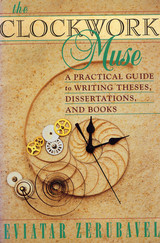
For anyone who has blanched at the uphill prospect of finishing a long piece of writing, this book holds out something more practical than hope: it offers a plan. The Clockwork Muse is designed to help prospective authors develop a workable timetable for completing long and often formidable projects.
The idea of dashing off a manuscript in a fit of manic inspiration may be romantic, but it is not particularly practical. Instead, Eviatar Zerubavel, a prolific and successful author, describes how to set up a writing schedule and regular work habits that will take most of the anxiety and procrastination out of long-term writing, and even make it enjoyable. The dreaded ‘writer’s block’ often turns out to be simply a need for a better grasp of the temporal organization of work.
The Clockwork Muse rethinks the writing process in terms of time and organization. It offers writers a simple yet comprehensive framework that considers such variables as when to write, for how long, and how often, while keeping a sense of momentum throughout the entire project. It shows how to set priorities, balance ideals against constraints, and find the ideal time to write. For all those whose writing has languished, waiting for the “right moment,” The Clockwork Muse announces that the moment has arrived.
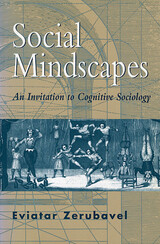
Why do we eat sardines, but never goldfish; ducks, but never parrots? Why does adding cheese make a hamburger a "cheeseburger" whereas adding ketchup does not make it a "ketchupburger"? By the same token, how do we determine which things said at a meeting should be included in the minutes and which ought to be considered "off the record" and officially disregarded?
In this wide-ranging and provocative book, Eviatar Zerubavel argues that cognitive science cannot answer these questions, since it addresses cognition on only two levels: the individual and the universal. To fill the gap between the Romantic vision of the solitary thinker whose thoughts are the product of unique experience, and the cognitive-psychological view, which revolves around the search for the universal foundations of human cognition, Zerubavel charts an expansive social realm of mind--a domain that focuses on the conventional, normative aspects of the way we think.
With witty anecdote and revealing analogy, Zerubavel illuminates the social foundation of mental actions such as perceiving, attending, classifying, remembering, assigning meaning, and reckoning the time. What takes place inside our heads, he reminds us, is deeply affected by our social environments, which are typically groups that are larger than the individual yet considerably smaller than the human race. Thus, we develop a nonuniversal software for thinking as Americans or Chinese, lawyers or teachers, Catholics or Jews, Baby Boomers or Gen-Xers. Zerubavel explores the fascinating ways in which thought communities carve up and classify reality, assign meanings, and perceive things, "defamiliarizing" in the process many taken-for-granted assumptions.
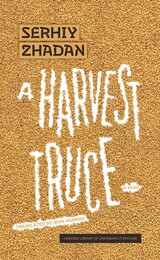
Brothers Anton and Tolik reunite at their family home to bury their recently deceased mother. An otherwise natural ritual unfolds under extraordinary circumstances: their house is on the front line of a war ignited by Russian-backed separatists in eastern Ukraine. Isolated without power or running water, the brothers’ best hope for success and survival lies in the declared cease fire—the harvest truce. But such hopes are swiftly dashed, as it becomes apparent that the conflagration of war will not abate.
With echoes of Waiting for Godot, Serhiy Zhadan’s A Harvest Truce stages a tragicomedy in which the commonplace experiences of death, birth, and the cycles of life marked by the practices of growing and harvesting food are rendered futile and farcical in the wake of the indifferent juggernaut of war.

The Qing dynasty office purchase system (juanna), which allowed individuals to pay for appointments in the government, was regarded in traditional Chinese historiography as an inherently corrupt and anti-meritocratic practice. It enabled participants to become civil and military officials while avoiding the competitive government-run examination systems.
Lawrence Zhang’s groundbreaking study of a broad selection of new archival and other printed evidence—including a list of over 10,900 purchasers of offices from 1798 and narratives of purchase—contradicts this widely held assessment and investigates how observers and critics of the system, past and present, have informed this questionable negative view. The author argues that, rather than seeing office purchase as a last resort for those who failed to obtain official appointments via other means, it was a preferred method for wealthy and well-connected individuals to leverage their social capital to the fullest extent. Office purchase was thus not only a useful device that raised funds for the state, but also a political tool that, through literal investments in their positions and their potential to secure status and power, tied the interests of official elites ever more closely to those of the state.

The Qing dynasty office purchase system (juanna), which allowed individuals to pay for appointments in the government, was regarded in traditional Chinese historiography as an inherently corrupt and anti-meritocratic practice. It enabled participants to become civil and military officials while avoiding the competitive government-run examination systems.
Lawrence Zhang’s groundbreaking study of a broad selection of new archival and other printed evidence—including a list of over 10,900 purchasers of offices from 1798 and narratives of purchase—contradicts this widely held assessment and investigates how observers and critics of the system, past and present, have informed this questionable negative view. The author argues that, rather than seeing office purchase as a last resort for those who failed to obtain official appointments via other means, it was a preferred method for wealthy and well-connected individuals to leverage their social capital to the fullest extent. Office purchase was thus not only a useful device that raised funds for the state, but also a political tool that, through literal investments in their positions and their potential to secure status and power, tied the interests of official elites ever more closely to those of the state.

Law is a moving system of rules that changes according to a nation’s political and socioeconomic development. To understand the law of the People’s Republic of China today, it is imperative to learn the history and philosophy of the law when it was first shaped. This is a comprehensive introduction to Chinese legal scholarship and the prominent scholars who developed it during the initial decades of the PRC, when the old Chinese legal system was abolished by the newly established Communist government. With responsibilities for full-scale recovery and reconstruction, while cultivating entirely new disciplines and branches of legal studies, the thirty-three leading legal scholars featured herein became the creators, pioneers, and teachers of the new Communist legal system. Through their scholarship, we can see where the field of Chinese legal studies came from, and where it is going.
Nongji Zhang reveals the stories of the most prominent PRC legal scholars, including their backgrounds, scholarly contributions, and important works. This essential tool and resource for the study of Chinese law will be of great use to faculty, students, scholars, librarians, and anyone interested in the field.
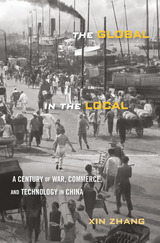
The story of globalization in the nineteenth and early twentieth centuries as experienced by ordinary people in the Chinese river town of Zhenjiang.
Fear swept Zhenjiang as British soldiers gathered outside the city walls in the summer of 1842. Already suspicious of foreigners, locals had also heard of the suffering the British inflicted two months earlier, in Zhapu. A wave of suicides and mercy killings ensued: rather than leave their families to the invaders, hundreds of women killed themselves and their children or died at the hands of male family members. British observers decried an “Asian culture” of ritual suicide. In reality, the event was sui generis—a tragic result of colliding local and global forces in nineteenth-century China.
Xin Zhang’s groundbreaking history examines the intense negotiations between local societies and global changes that created modern China. In the nineteenth and early twentieth centuries, world-historic political, economic, and technological developments transformed the textures of everyday life in places like Zhenjiang, a midsize river town in China’s prosperous Lower Yangzi region. Drawing on rare primary sources, including handwritten diaries and other personal writings, Zhang offers a ground-level view of globalization in the city. We see civilians coping with the traumatic international encounters of the Opium War; Zhenjiang brokers bankrolling Shanghai’s ascendance as a cosmopolitan commercial hub; and merchants shipping goods to market, for the first time, on steamships.
Far from passive recipients, the Chinese leveraged, resisted, and made change for themselves. Indeed, The Global in the Local argues that globalization is inevitably refracted through local particularities.
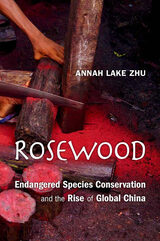
A riveting study of the booming rosewood trade between China and Madagascar uncovers an alternative approach to environmentalism that disrupts Western models.
Rosewood is the world’s most trafficked endangered species by value, accounting for larger outlays than ivory, rhino horn, and big cats put together. Nearly all rosewood logs are sent to China, fueling a $26 billion market for classically styled furniture. Vast expeditions across Asia and Africa search for the majestic timber, and legions of Chinese ships sail for Madagascar, where rosewood is purchased straight from the forest.
The international response has been to interdict the trade, but in this incisive account Annah Lake Zhu suggests that environmentalists have misunderstood both the intent and the effect of China’s appetite for rosewood, causing social and ecological damage in the process. For one thing, Chinese consumers are understandably seeking to reclaim their cultural heritage, restoring a centuries-old tradition of home furnishing that the Cultural Revolution had condemned. In addition, Chinese firms are investing in environmental preservation. Far from simply exploiting the tree, businesses are carefully managing valuable forests and experimenting with extensive new plantings. This sustainable-use paradigm differs dramatically from the conservation norms preferred by Western-dominated NGOs, whose trade bans have prompted speculation and high prices, even encouraging criminal activity. Meanwhile, attempts to arm conservation task forces—militias meant to guard the forests—have backfired.
Drawing on years of fieldwork in China and Madagascar, Rosewood upends the pieties of the global aid industry. Zhu offers a rigorous look at what environmentalism and biodiversity protection might look like in a world no longer dominated by the West.
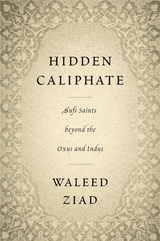
Winner of the Albert Hourani Book Award
Sufis created the most extensive Muslim revivalist network in Asia before the twentieth century, generating a vibrant Persianate literary, intellectual, and spiritual culture while tying together a politically fractured world.
In a pathbreaking work combining social history, religious studies, and anthropology, Waleed Ziad examines the development across Asia of Muslim revivalist networks from the eighteenth to the twentieth centuries. At the center of the story are the Naqshbandi-Mujaddidi Sufis, who inspired major reformist movements and articulated effective social responses to the fracturing of Muslim political power amid European colonialism. In a time of political upheaval, the Mujaddidis fused Persian, Arabic, Turkic, and Indic literary traditions, mystical virtuosity, popular religious practices, and urban scholasticism in a unified yet flexible expression of Islam. The Mujaddidi “Hidden Caliphate,” as it was known, brought cohesion to diverse Muslim communities from Delhi through Peshawar to the steppes of Central Asia. And the legacy of Mujaddidi Sufis continues to shape the Muslim world, as their institutional structures, pedagogies, and critiques have worked their way into leading social movements from Turkey to Indonesia, and among the Muslims of China.
By shifting attention away from court politics, colonial actors, and the standard narrative of the “Great Game,” Ziad offers a new vision of Islamic sovereignty. At the same time, he demonstrates the pivotal place of the Afghan Empire in sustaining this vast inter-Asian web of scholastic and economic exchange. Based on extensive fieldwork across Afghanistan, Uzbekistan, and Pakistan at madrasas, Sufi monasteries, private libraries, and archives, Hidden Caliphate reveals the long-term influence of Mujaddidi reform and revival in the eastern Muslim world, bringing together seemingly disparate social, political, and intellectual currents from the Indian Ocean to Siberia.

Forty years after the U.S. Supreme Court handed down its decision legalizing abortion, Roe v. Wade continues to make headlines. After Roe: The Lost History of the Abortion Debate cuts through the myths and misunderstandings to present a clear-eyed account of cultural and political responses to the landmark 1973 ruling in the decade that followed. The grassroots activists who shaped the discussion after Roe, Mary Ziegler shows, were far more fluid and diverse than the partisans dominating the debate today.
In the early years after the decision, advocates on either side of the abortion battle sought common ground on issues from pregnancy discrimination to fetal research. Drawing on archives and more than 100 interviews with key participants, Ziegler’s revelations complicate the view that abortion rights proponents were insensitive to larger questions of racial and class injustice, and expose as caricature the idea that abortion opponents were inherently antifeminist. But over time, “pro-abortion” and “anti-abortion” positions hardened into “pro-choice” and “pro-life” categories in response to political pressures and compromises. This increasingly contentious back-and-forth produced the interpretation now taken for granted—that Roe was primarily a ruling on a woman’s right to choose.
Peering beneath the surface of social-movement struggles in the 1970s, After Roe reveals how actors on the left and the right have today made Roe a symbol for a spectrum of fervently held political beliefs.

For most Americans today, Roe v. Wade concerns just one thing: the right to choose abortion. But the Supreme Court’s decision once meant much more. The justices ruled that the right to privacy encompassed the abortion decision. Grassroots activists and politicians used Roe—and popular interpretations of it—as raw material in answering much larger questions: Is there a right to privacy? For whom, and what is protected?
As Mary Ziegler demonstrates, Roe’s privacy rationale attracted a wide range of citizens demanding social changes unrelated to abortion. Movements questioning hierarchies based on sexual orientation, profession, class, gender, race, and disability drew on Roe to argue for an autonomy that would give a voice to the vulnerable. So did advocates seeking expanded patient rights and liberalized euthanasia laws. Right-leaning groups also invoked Roe’s right to choose, but with a different agenda: to attack government involvement in consumer protection, social welfare, racial justice, and other aspects of American life.
In the 1980s, seeking to unify a fragile coalition, the Republican Party popularized the idea that Roe was a symbol of judicial tyranny, discouraging anyone from relying on the decision to frame their demands. But Beyond Abortion illuminates the untapped potential of arguments that still resonate today. By recovering the diversity of responses to Roe, and the legal and cultural battles it energized, Ziegler challenges readers to come to terms with the uncomfortable fact that privacy belongs to no party or cause.

The Iliad reveals a traditional oral poetic style, but many researchers believe that the poem cannot be treated as solely a product of oral tradition. In The Iliad and the Oral Epic Tradition, Karol Zieliński argues that neither Homer’s unique artistry nor references to events known from other songs necessarily indicate the use of writing in its composition. The development of traditional oral cycles suggests that the Iliad is only one of many possible retellings of the story of the Trojan War, in this case with Achilles playing the role of protagonist.
The singer has at his disposal a wide range of techniques to attract and arouse the attention of his listeners. He builds on their knowledge of traditional tales—such as the death of Achilles—in all their various forms, as they exist in the collective memory of the society. The singer may intentionally remodel central characters like Achilles, Odysseus, or Paris, without changing their traditional roles or their destinies. As Zieliński demonstrates, the oral poet can alter the plot of a traditional episode as well as transform its ideological significance. Every cyclic song echoes the story of the entire war, even as it depicts only one episode, traditionally extracted from the beginning or the end of the macro-story.



The writer Nakagami Kenji (1946-1992) rose to fame in the mid-1970s for his vivid stories about a clan scarred by violence and poverty on the underside of the Japanese economic miracle. Drawing upon the lives, experiences, and languages of the burakumin, the outcaste communities long discriminated against in Japanese society as a defiled underclass, Nakagami's works of fiction and nonfiction record with vitality and violence the realities—actual and imagined—of buraku culture.
In this critical study of Nakagami's life and oeuvre, Eve Zimmerman delves into the writer's literary world, exploring the genres, forms, and themes with which Nakagami worked and experimented. These chapters trace the biographical thread running through his works while foregrounding such diverse facets of his writing as his interest in the modern possibilities of traditional myths and forms of storytelling, his deployment of shocking tropes and images, and his crafting of a unique poetic language.
By bringing to the fore the literary urgency and social engagement that informed all aspects of Nakagami's creative and intellectual production, from his works of prose and poetry to his criticism, this book argues eloquently and effectively for us to appreciate Nakagami as a distinctive and relevant voice in modern Japanese literature.
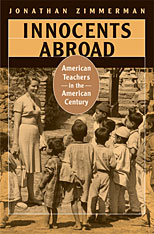
Protestant missionaries in Latin America. Colonial "civilizers" in the Pacific. Peace Corps Volunteers in Africa. Since the 1890s, thousands of American teachers--mostly young, white, middle-class, and inexperienced--have fanned out across the globe. Innocents Abroad tells the story of what they intended to teach and what lessons they learned.
Drawing on extensive archives of the teachers' letters and diaries, as well as more recent accounts, Jonathan Zimmerman argues that until the early twentieth century, the teachers assumed their own superiority; they sought to bring civilization, Protestantism, and soap to their host countries. But by the mid-twentieth century, as teachers borrowed the concept of "culture" from influential anthropologists, they became far more self-questioning about their ethical and social assumptions, their educational theories, and the complexity of their role in a foreign society.
Filled with anecdotes and dilemmas--often funny, always vivid--Zimmerman's narrative explores the teachers' shifting attitudes about their country and themselves, in a world that was more unexpected and unsettling than they could have imagined.

What do America’s children learn about American history, American values, and human decency? Who decides? In this absorbing book, Jonathan Zimmerman tells the dramatic story of conflict, compromise, and more conflict over the teaching of history and morality in twentieth-century America.
In history, whose stories are told, and how? As Zimmerman reveals, multiculturalism began long ago. Starting in the 1920s, various immigrant groups—the Irish, the Germans, the Italians, even the newly arrived Eastern European Jews—urged school systems and textbook publishers to include their stories in the teaching of American history. The civil rights movement of the 1960s and ’70s brought similar criticism of the white version of American history, and in the end, textbooks and curricula have offered a more inclusive account of American progress in freedom and justice.
But moral and religious education, Zimmerman argues, will remain on much thornier ground. In battles over school prayer or sex education, each side argues from such deeply held beliefs that they rarely understand one another’s reasoning, let alone find a middle ground for compromise. Here there have been no resolutions to calm the teaching of history. All the same, Zimmerman argues, the strong American tradition of pluralism has softened the edges of the most rigorous moral and religious absolutism.
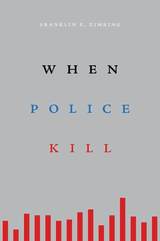
“A remarkable book.”—Malcolm Gladwell, San Francisco Chronicle
Deaths of civilians at the hands of on-duty police are in the national spotlight as never before. How many killings by police occur annually? What circumstances provoke police to shoot to kill? Who dies? The lack of answers to these basic questions points to a crisis in American government that urgently requires the attention of policy experts. When Police Kill is a groundbreaking analysis of the use of lethal force by police in the United States and how its death toll can be reduced.
Franklin Zimring compiles data from federal records, crowdsourced research, and investigative journalism to provide a comprehensive, fact-based picture of how, when, where, and why police resort to deadly force. Of the 1,100 killings by police in the United States in 2015, he shows, 85 percent were fatal shootings and 95 percent of victims were male. The death rates for African Americans and Native Americans are twice their share of the population.
Civilian deaths from shootings and other police actions are vastly higher in the United States than in other developed nations, but American police also confront an unusually high risk of fatal assault. Zimring offers policy prescriptions for how federal, state, and local governments can reduce killings by police without risking the lives of officers. Criminal prosecution of police officers involved in killings is rare and only necessary in extreme cases. But clear administrative rules could save hundreds of lives without endangering police officers.
“Roughly 1,000 Americans die each year at the hands of the police…The civilian body count does not seem to be declining, even though violent crime generally and the on-duty deaths of police officers are down sharply…Zimring’s most explosive assertion—which leaps out…—is that police leaders don’t care…To paraphrase the French philosopher Joseph de Maistre, every country gets the police it deserves.”
—Bill Keller, New York Times
“If you think for one second that the issue of cop killings doesn’t go to the heart of the debate about gun violence, think again. Because what Zimring shows is that not only are most fatalities which occur at the hands of police the result of cops using guns, but the number of such deaths each year is undercounted by more than half!…[A] valuable and important book…It needs to be read.”
—Mike Weisser, Huffington Post

The Cambridge Songs, from the Latin Carmina Cantabrigiensia, is the most important anthology of songs from before the thirteenth-century Carmina Burana. It offers the only major surviving anthology of Latin lyric poems from between Charlemagne and the Battle of Hastings. It contains panegyrics and dirges, political poems, comic tales, religious and didactic poems, and poetry of spring and love. Was it a school book for students, or a songbook for the use of professional entertainers? The greatest certainty is that the poems were composed in the learned language, and that they were associated with song. The collection is like the contents of an eleventh-century jukebox or playlist of top hits from more than three centuries.
This edition and translation comprises a substantial introduction, the Latin texts and English prose in carefully matched presentation, and extensive commentary, along with appendices, list of works cited, and indices.

Nigel of Canterbury, also known as Longchamp and Whiteacre, wrote toward the end of the so-called Twelfth-Century Renaissance. He was a Benedictine monk of Christ Church when Thomas Becket was martyred, and a star of Anglo-Latin literature while the Angevin kings held sway over a vast empire that encompassed not only the British Isles but also western France.
The Dumbarton Oaks Medieval Library volume features, alongside the Latin, the first-ever English translation of Nigel’s second-longest poem, Miracles of the Virgin. The Miracles is the oldest extant collection of versified miracles of Mary in Latin and indeed in any language. The seventeen narratives, telling a gamut of tales from diabolic pacts to pregnant abbesses, gave scope for Nigel to display skills as a storyteller and stylist, while recounting the miraculous mercy of the Virgin. This supplement offers an extensive commentary to facilitate appreciation of the Miracles as poetry by a medieval writer deeply imbued in the long tradition of Latin literature.




Solomon and Marcolf is known for being both important and mysterious. It pits wise Solomon, famous from the Bible, against a wily peasant named Marcolf. One of its two parts is a dialogue, in which the king and jester, sage and fool, prophet and blasphemer bandy back and forth questions and comments. Whereas Solomon is solemn and pompous, Marcolf resorts to low language and earthy topics. The other part comprises twenty short chapters in which Marcolf tricks Solomon time and again. These episodes are as impudent and scatological as is the dialogue. Together, the two parts constitute a rudimental prose novel or “rogue biography.”
Cited by Bakhtin in Rabelais and His World, Solomon and Marcolf is widely known by name. But until now it has not been translated into any modern language. The present volume offers an introduction, followed by the Latin and English, detailed commentary, and reproductions of woodcut illustrations from the 1514 edition. Appendixes help readers understand the origins and influence of a work that was composed around 1200, that attained its greatest popularity in the fifteenth and sixteenth centuries, and that has the potential still today to delight and instruct.

The Latin prose Solomon and Marcolf, enigmatic in origins, has been a puzzle from long before the sixteenth-century French author François Rabelais through the twentieth-century Russian critic Bakhtin to today. Though often called a dialogue, the second of its two parts comprises a rudimentary novel with twenty episodes. In 2009 the “original” received at last an edition and translation with commentary as the first volume in the Harvard Studies in Medieval Latin series.
Solomon and Marcolf: Vernacular Traditions, the fourth volume in the series, displays the mysteries of the tradition. Solomon relates to the biblical king, but did Marcolf originate in Germanic or Eastern regions? Here lovers of literature and folklore may explore, in English for the first time, relevant texts, from the twelfth through the early eighteenth century. These astonishingly varied and fascinating pieces, from Iceland in the North and West through Russia in the East and Italy in the South, have been translated from medieval and early modern French, Russian, German, Icelandic, Danish, and Italian. The book opens with snapshots of two nineteenth-century polymaths, the Englishman John M. Kemble and Russian Aleksandr Veselovskii, whose hypotheses can now be evaluated. An appendix documents awareness of Solomon and Marcolf in late medieval and early modern times.

The Latin prose Solomon and Marcolf, enigmatic in origins, has been a puzzle from long before the sixteenth-century French author François Rabelais through the twentieth-century Russian critic Bakhtin to today. Though often called a dialogue, the second of its two parts comprises a rudimentary novel with twenty episodes. In 2009 the “original” received at last an edition and translation with commentary as the first volume in the Harvard Studies in Medieval Latin series.
Solomon and Marcolf: Vernacular Traditions, the fourth volume in the series, displays the mysteries of the tradition. Solomon relates to the biblical king, but did Marcolf originate in Germanic or Eastern regions? Here lovers of literature and folklore may explore, in English for the first time, relevant texts, from the twelfth through the early eighteenth century. These astonishingly varied and fascinating pieces, from Iceland in the North and West through Russia in the East and Italy in the South, have been translated from medieval and early modern French, Russian, German, Icelandic, Danish, and Italian. The book opens with snapshots of two nineteenth-century polymaths, the Englishman John M. Kemble and Russian Aleksandr Veselovskii, whose hypotheses can now be evaluated. An appendix documents awareness of Solomon and Marcolf in late medieval and early modern times.

A grandson’s photo album. Old postcards. English porcelain. A granite headstone. These are just a few of the material objects that help reconstruct the histories of colonial people who lived during Japan’s empire. These objects, along with oral histories and visual imagery, reveal aspects of lives that reliance on the colonial archive alone cannot. They help answer the primary question of Lost Histories: Is it possible to write the history of Japan’s colonial subjects? Kirsten Ziomek contends that it is possible, and in the process she brings us closer to understanding the complexities of their lives.
Lost Histories provides a geographically and temporally holistic view of the Japanese empire from the early 1900s to the 1970s. The experiences of the four least-examined groups of Japanese colonial subjects—the Ainu, Taiwan’s indigenous people, Micronesians, and Okinawans—are the centerpiece of the book. By reconstructing individual life histories and following these people as they crossed colonial borders to the metropolis and beyond, Ziomek conveys the dynamic nature of an empire in motion and explains how individuals navigated the vagaries of imperial life.


Winner of the Robert H. Ferrell Book Prize
“The Idealist is a powerful book, gorgeously written and consistently insightful. Samuel Zipp uses the 1942 world tour of Wendell Willkie to examine American attitudes toward internationalism, decolonization, and race in the febrile atmosphere of the world’s first truly global conflict.”
—Andrew Preston, author of Sword of the Spirit, Shield of Faith
A dramatic account of the plane journey undertaken by businessman-turned-maverick-internationalist Wendell Willkie to rally US allies to the war effort. Willkie’s tour of a planet shrunk by aviation and war inspired him to challenge Americans to fight a rising tide of nationalism at home.
In August 1942, as the threat of fascism swept the world, a charismatic Republican presidential contender boarded the Gulliver at Mitchel Airfield for a seven-week journey around the world. Wendell Willkie covered 31,000 miles as President Roosevelt’s unofficial envoy. He visited the battlefront in North Africa with General Montgomery, debated a frosty de Gaulle in Beirut, almost failed to deliver a letter to Stalin in Moscow, and allowed himself to be seduced by Chiang Kai-shek in China. Through it all, he was struck by the insistent demands for freedom across the world.
In One World, the runaway bestseller he published on his return, Willkie challenged Americans to resist the “America first” doctrine espoused by the war’s domestic opponents and warned of the dangers of “narrow nationalism.” He urged his fellow citizens to end colonialism and embrace “equality of opportunity for every race and every nation.” With his radio broadcasts regularly drawing over 30 million listeners, he was able to reach Americans directly in their homes. His call for a more equitable and interconnected world electrified the nation, until he was silenced abruptly by a series of heart attacks in 1944. With his death, America lost its most effective globalist, the man FDR referred to as “Private Citizen Number One.”
At a time when “America first” is again a rallying cry, Willkie’s message is at once chastening and inspiring, a reminder that “one world” is more than a matter of supply chains and economics, and that racism and nationalism have long been intertwined.

Winner of the National Book Critics Circle Award
“Impeccably researched and seductively readable…tells the story of Sam Sharpe’s revolution manqué, and the subsequent abolition of slavery in Jamaica, in a way that’s acutely relevant to the racial unrest of our own time.” —Madison Smartt Bell, author of All Souls’ Rising
The final uprising of enslaved people in Jamaica started as a peaceful labor strike a few days shy of Christmas in 1831. A harsh crackdown by white militias quickly sparked a full-blown revolt, leaving hundreds of plantation houses in smoking ruins. The rebels lost their daring bid for freedom, but their headline-grabbing defiance triggered a decisive turn against slavery.
Island on Fire is a dramatic day-by-day account of these transformative events. A skillful storyteller, Tom Zoellner uses diaries, letters, and colonial records to tell the intimate story of the men and women who rose up and briefly tasted liberty. He brings to life the rebellion’s enigmatic leader, the preacher Samuel Sharpe, and shows how his fiery resistance turned the tide of opinion in London and hastened the end of slavery in the British Empire.
“Zoellner’s vigorous, fast-paced account brings to life a varied gallery of participants…The revolt failed to improve conditions for the enslaved in Jamaica, but it crucially wounded the institution of slavery itself.” —Fergus M. Bordewich, Wall Street Journal
“It’s high time that we had a book like the splendid one Tom Zoellner has written: a highly readable but carefully documented account of the greatest of all British slave rebellions, the miseries that led to it, and the momentous changes it wrought.” —Adam Hochschild, author of Bury the Chains
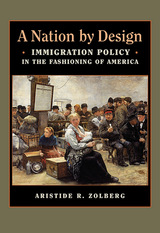
According to the national mythology, the United States has long opened its doors to people from across the globe, providing a port in a storm and opportunity for any who seek it. Yet the history of immigration to the United States is far different. Even before the xenophobic reaction against European and Asian immigrants in the late nineteenth century, social and economic interest groups worked to manipulate immigration policy to serve their needs. In A Nation by Design, Aristide Zolberg explores American immigration policy from the colonial period to the present, discussing how it has been used as a tool of nation building.
A Nation by Design argues that the engineering of immigration policy has been prevalent since early American history. However, it has gone largely unnoticed since it took place primarily on the local and state levels, owing to constitutional limits on federal power during the slavery era. Zolberg profiles the vacillating currents of opinion on immigration throughout American history, examining separately the roles played by business interests, labor unions, ethnic lobbies, and nativist ideologues in shaping policy. He then examines how three different types of migration--legal migration, illegal migration to fill low-wage jobs, and asylum-seeking--are shaping contemporary arguments over immigration to the United States.
A Nation by Design is a thorough, authoritative account of American immigration history and the political and social factors that brought it about. With rich detail and impeccable scholarship, Zolberg's book shows how America has struggled to shape the immigration process to construct the kind of population it desires.

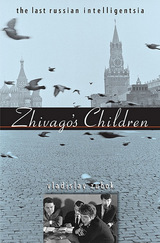
Among the least-chronicled aspects of post–World War II European intellectual and cultural history is the story of the Russian intelligentsia after Stalin. Young Soviet veterans had returned from the heroic struggle to defeat Hitler only to confront the repression of Stalinist society. The world of the intelligentsia exerted an attraction for them, as it did for many recent university graduates. In its moral fervor and its rejection of authoritarianism, this new generation of intellectuals resembled the nineteenth-century Russian intelligentsia that had been crushed by revolutionary terror and Stalinist purges. The last representatives of the Russian intelligentsia, heartened by Khrushchev’s denunciation of Stalinism in 1956, took their inspiration from the visionary aims of their nineteenth-century predecessors and from the revolutionary aspirations of 1917. In pursuing the dream of a civil, democratic socialist society, such idealists contributed to the political disintegration of the communist regime.
Vladislav Zubok turns a compelling subject into a portrait as intimate as it is provocative. The highly educated elite—those who became artists, poets, writers, historians, scientists, and teachers—played a unique role in galvanizing their country to strive toward a greater freedom. Like their contemporaries in the United States, France, and Germany, members of the Russian intelligentsia had a profound effect during the 1960s, in sounding a call for reform, equality, and human rights that echoed beyond their time and place.
Zhivago’s children, the spiritual heirs of Boris Pasternak’s noble doctor, were the last of their kind—an intellectual and artistic community committed to a civic, cultural, and moral mission.

Covering the volatile period from 1945 to 1962, Vladislav Zubok and Constantine Pleshakov explore the personalities and motivations of the key people who directed Soviet political life and shaped Soviet foreign policy. They begin with the fearsome figure of Joseph Stalin, who was driven by the dual dream of a Communist revolution and a global empire. They reveal the scope and limits of Stalin’s ambitions by taking us into the world of his closest subordinates, the ruthless and unimaginative foreign minister Molotov and the Party’s chief propagandist, Zhdanov, a man brimming with hubris and missionary zeal. The authors expose the machinations of the much-feared secret police chief Beria and the party cadre manager Malenkov, who tried but failed to set Soviet policies on a different course after Stalin’s death. Finally, they document the motives and actions of the self-made and self-confident Nikita Khrushchev, full of Russian pride and party dogma, who overturned many of Stalin’s policies with bold strategizing on a global scale. The authors show how, despite such attempts to change Soviet diplomacy, Stalin’s legacy continued to divide Germany and Europe, and led the Soviets to the split with Maoist China and to the Cuban missile crisis.
Zubok and Pleshakov’s groundbreaking work reveals how Soviet statesmen conceived and conducted their rivalry with the West within the context of their own domestic and global concerns and aspirations. The authors persuasively demonstrate that the Soviet leaders did not seek a conflict with the United States, yet failed to prevent it or bring it to conclusion. They also document why and how Kremlin policy-makers, cautious and scheming as they were, triggered the gravest crises of the Cold War in Korea, Berlin, and Cuba. Taking us into the corridors of the Kremlin and the minds of its leaders, Zubok and Pleshakov present intimate portraits of the men who made the West fear, to reveal why and how they acted as they did.
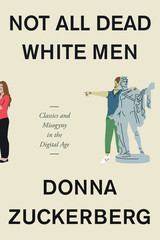
A Times Higher Education Book of the Week
A virulent strain of antifeminism is thriving online that treats women’s empowerment as a mortal threat to men and to the integrity of Western civilization. Its proponents cite ancient Greek and Latin texts to support their claims—from Ovid’s Ars Amatoria to Seneca and Marcus Aurelius—arguing that they articulate a model of masculinity that sustained generations but is now under siege. Not All Dead White Men reveals that some of the most controversial and consequential debates about the legacy of the ancients are raging not in universities but online.
“A chilling account of trolling, misogyny, racism, and bad history proliferated online by the Alt-Right… Zuckerberg makes a persuasive case for why we need a new, more critical, and less comfortable relationship between the ancient and modern worlds in this important and very timely book.”
—Emily Wilson, translator of The Odyssey
“Explores how ideas about Ancient Greece and Rome are used and misused by antifeminist thinkers today.”
—Time
“Zuckerberg presciently analyzes these communities’…embrace of stoicism as a self-help tool to gain confidence, jobs, and girlfriends. Their adoration of men like Marcus Aurelius, Epictetus, and Ovid…is founded in a limited and distorted interpretation of ancient philosophy…lending heft and authority to sexism and abuse.”
—The Nation
“Traces the application—and misapplication—of classical authors and texts in online communities that see feminism as a threat.”
—Bitch Media


Shen Gua (1031−1095) is a household name in China, known as a distinguished renaissance man and the author of Brush Talks from Dream Brook, an old text whose remarkable “scientific” discoveries make it appear curiously ahead of its time. In this first book-length study of Shen in English, Ya Zuo reveals the connection between Shen’s life as an active statesman and his ideas, specifically the empirical stance manifested through his wide-ranging inquiries. She places Shen on the broad horizon of premodern Chinese thought, and presents his empiricism within an extensive narrative of Chinese epistemology.
Relying on Shen as a searchlight, Zuo focuses in on how an individual thinker summoned conditions and concepts from the vast Chinese intellectual tradition to build a singular way of knowing. Moreover, her study of Shen provides insights into the complex dynamics in play at the dawn of the age of Neo-Confucianism and compels readers to achieve a deeper appreciation of the diversity in Chinese thinking.


During and after the Cultural Revolution, radical leaders in the Chinese Communist Party tried to mobilize rural society for socioeconomic and political changes and move rural China to even higher stages of collectivism. David Zweig argues that because advocates of agrarian radicalism formed a minority group within China’s central leadership, they acted in opposition to the dominant moderate forces and resorted to alternative strategies to mobilize support for their unofficial policies. The limited institutionalization of the system allowed the radicals to promote their principles through “policy winds,” speeches generated by newspaper articles, networks of political allies, and organized visits; they also linked their policies to ongoing political and economic campaigns. In spite of this radical ideology and frequent upheavals in the countryside, Zweig finds that Chinese peasants had no ideological affinity for Mao’s theory of the continuing revolution and reacted to each policy change on the basis of how it affected their personal, family, or collective interests. Despite intense propaganda, cadres adjusted the impact of these radical policies so that the peasants’ conservative mindset, entrepreneurial spirit, and desire to improve their own lot remained intact.
Zweig examines the local realities of the radicals’ program by describing the results of specific policies; he discriminates among the responses of officials at different bureaucratic levels, peasants of varying income levels and family structures, and villages with specific geographic and socioeconomic characteristics. He draws on his own field research in Chinese villages and interviews with Chinese college students and their friends who had lived in the countryside and emigrés in Hong Kong who had lived and worked in rural China.
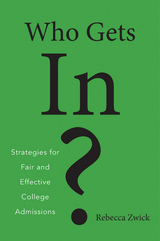
When it comes to the hotly disputed topic of college admissions, the one thing everyone agrees about is that it’s unfair. But there is little agreement on what a fair process would be.
Rebecca Zwick takes a hard look at the high-stakes competition of U.S. college admissions today. Illustrating her points using analyses of survey data from applicants to the nation’s top colleges and universities, she assesses the goals of different admissions systems and the fairness of criteria—from high school grades and standardized test scores to race, socioeconomic status, and students’ academic aspirations. The demographic makeup of the class and the educational outcomes of its students can vary substantially, depending upon how an institution approaches its task. Who Gets In? considers the merits and flaws of competing approaches and demonstrates that admissions policies can sometimes fail to produce the desired results. For example, some nontraditional selection methods can hurt more than help the students they are intended to benefit.
As Zwick shows, there is no objective way to evaluate admissions systems—no universal definition of student merit or blanket entitlement to attend college. Some schools may hope to attract well-rounded students, while others will focus on specific academic strengths. What matters most is that a school’s admissions policy reflects its particular educational philosophy. Colleges should be free to include socioeconomic and racial preferences among their admissions criteria, Zwick contends, but they should strive for transparency about the factors they use to evaluate applicants.

The history of the book in nineteenth-century Japan follows an uneven course that resists the simple chronology often used to mark the divide between premodern and modern literary history.
By examining the obscured histories of publication, circulation, and reception of widely consumed literary works from late Edo to the early Meiji period, Jonathan Zwicker traces a genealogy of the literary field across a long nineteenth century: one that stresses continuities between the generic conventions of early modern fiction and the modern novel. In the literature of sentiment Zwicker locates a tear-streaked lens through which to view literary practices and readerly expectations that evolved across the century.
Practices of the Sentimental Imagination emphasizes both qualitative and quantitative aspects of literary production and consumption, balancing close readings of canonical and noncanonical texts, sophisticated applications of critical theory, and careful archival research into the holdings of nineteenth-century lending libraries and private collections. By exploring the relationships between and among Japanese literary works and texts from late imperial China, Europe, and America, Zwicker also situates the Japanese novel within a larger literary history of the novel across the global nineteenth century.
READERS
Browse our collection.
PUBLISHERS
See BiblioVault's publisher services.
STUDENT SERVICES
Files for college accessibility offices.
UChicago Accessibility Resources
home | accessibility | search | about | contact us
BiblioVault ® 2001 - 2024
The University of Chicago Press









